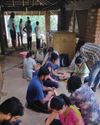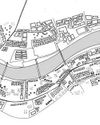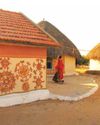urbz is an experimental action and research collective specialized in participatory planning and design. Matias Echanove and Rahul Srivastava are co-founders of this platform for experimental urban research and action, with collaborators in Mumbai, Goa, São Paulo, Bogotá, Seoul and Geneva. The work of urbz has been exhibited at Dr. Bhau Daji Lad City Museum, Mumbai; MoMA, New York; MAXXI, Rome; MAK Vienna; The Centre for Contemporary Art in Bordeaux, the Istanbul Design Biennial; the Chicago Architecture Biennial; and the Sao Paulo Cultural Center. Rahul Srivastava studied social and urban anthropology in Mumbai, Delhi and Cambridge (UK). Matias Echanove studied government and economics at the London School of Economics, urban planning at Columbia University and urban information systems at the University of Tokyo.

The story of urbz and its co-founders started at a week-long workshop in Dharavi, Mumbai. The organisation works across the globe with people, places and cities. And much of their work is shaped from inferences that are derived from Mumbai. While cities like Mumbai are challenging to work with and within, it showcases a language of urbanism that is a complex yet significant premise in work of urbz. Their work has travelled from Mumbai to Sao Paulo, Bogota, Seoul, Geneva, Montreal and back to Mumbai wherein they have conducted workshops involving public participatory planning from their experiences in Dharavi. Their first project, the Dharavi workshop entailed planning and producing a counter-narrative to the Dharavi Redevelopment Project. The Dharavi residents aimed to establish that the settlement is not a slum, but a village. Its original inhabitants are the ‘koliwadas’ and the village has grown and accommodated multiple roles and functions. The organisation’s first learning from the project was that participatory planning is not a novel idea or invention but citizens at various levels and scales are already involved and perceptive. It is interesting to note details of how people are participating and building on existing frameworks to ideate or create something beyond those realms.
Esta historia es de la edición April 2018 de Indian Architect & Builder.
Comience su prueba gratuita de Magzter GOLD de 7 días para acceder a miles de historias premium seleccionadas y a más de 9,000 revistas y periódicos.
Ya eres suscriptor ? Conectar
Esta historia es de la edición April 2018 de Indian Architect & Builder.
Comience su prueba gratuita de Magzter GOLD de 7 días para acceder a miles de historias premium seleccionadas y a más de 9,000 revistas y periódicos.
Ya eres suscriptor? Conectar

Interlacing Perspectives
‘Meraki-2019’ A visionary Seminar series presented by Dr.Baliram Hiray College of Architecture, Bandra(East), Mumbai.

Facilitating A Community Through Architectural Practice
The humble, self-designed, self-built and organically planned home built by the majority of the world population rarely gets appreciated and critiqued as a viable lesson in architectural design.

The Art Of Solving Problems Creatively
The practice of architecture is perhaps incomplete without the complement of a variety of other arts.

Upcycling towards a playful tomorrow
Play is like the middle child, often forgotten, and always taking a back seat. For young kids, play can simply be running around, armwrestling with friends, building sandcastles on the beach, or singing popular music tracks in the shower.

Balancing The Poetics And Pragmatism Of Everyday Design
Humanity is faced with an oxymoronic crisis. The crisis involves the earth, the environment, impending looms of climate change, deforestation, loss of species, dwindling resources etc.

Just Give Me Some Space: Discussions And Beyond
Just Give Me Some Space (JGMSS) is Suha Riyaz Khopatkar’s debut book that paints a portrait of the dynamic life of an architecture student.

The Next In Vernacular Architecture
Architecture has become a capitalist.

Rethinking The Future: Architecture And Its Education
“I want to be like animals, the bird makes a nest in one or two days, the rat digs a hole in a night, but intelligent humans like us spend 30 years to have a house, that’s wrong.” - Jon Jandai

Uniting The Human-Scale With The City-Scale
London-based architect Usman Haque is famed for his interactive architectural systems, and for his exploration of newer, more effective ways of creating human engagement and interaction through his designs. Indian Architect & Builder caught up with him, to quiz him on a variety of topics such as his journey as an architect, his inspirations and philosophies, architects using the digital revolution to their advantage, and more!

Framing spaces
Almost every architect also doubles as a photographer or at least an enthusiast.